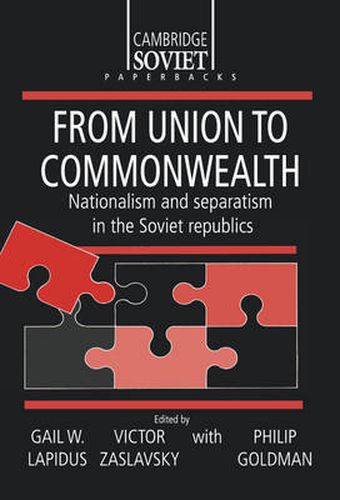Readings Newsletter
Become a Readings Member to make your shopping experience even easier.
Sign in or sign up for free!
You’re not far away from qualifying for FREE standard shipping within Australia
You’ve qualified for FREE standard shipping within Australia
The cart is loading…






The collapse of the Soviet Union and the emergence of fifteen independent states on its former territory is one of the most momentous developments of the twentieth century. In From Union to Commonwealth, five leading international scholars–Leokadia Drobizheva and Galina Starovoiteva from Russia, and Gail Lapidus, Ronald Suny and Victor Zaslavsky from North America–team up to examine the forces that lay behind the rise of national movements which challenged, then destroyed, the stability and territorial integrity of the former Soviet state. Writing from their different disciplinary perspectives–from political science, modern history and from sociology–these authors offer unique insights into the links between political structure and nationalism, finding that Soviet policies designed to eliminate national distinctiveness frequently had the unintended result of creating powerful new national identities. With the pursuit of perestroika and glasnost, such identities became potent political forces impelling the Soviet leadership to grapple with the growing tension between demands for regional sovereignity and the preservation of central economic and political control. The authors show how, in the course of this struggle, the international system often played a critical role. Non-Russian national movements sought to expand their ties to Europe or Asia even as they pursued independence from Moscow. In the end it was the transformation of Russian national consciousness, and the emergence of a Russian state which disassociated itself from the legacy of empire, which played a decisive role in the collapse of the center. The progressive weakening of central institutions and the emergence of increasingly assertive sovereign states was accelerated by the failed coup of August 1991. Presenting a broad and timely analysis of the national dimension of politics after perestroika, this book is essential reading for all thsoe seeking to understand the complexities underlying the demise of the Soviet state, as well as the emergence of new states actively engaged in defining their national identities at home and abroad.
$9.00 standard shipping within Australia
FREE standard shipping within Australia for orders over $100.00
Express & International shipping calculated at checkout
The collapse of the Soviet Union and the emergence of fifteen independent states on its former territory is one of the most momentous developments of the twentieth century. In From Union to Commonwealth, five leading international scholars–Leokadia Drobizheva and Galina Starovoiteva from Russia, and Gail Lapidus, Ronald Suny and Victor Zaslavsky from North America–team up to examine the forces that lay behind the rise of national movements which challenged, then destroyed, the stability and territorial integrity of the former Soviet state. Writing from their different disciplinary perspectives–from political science, modern history and from sociology–these authors offer unique insights into the links between political structure and nationalism, finding that Soviet policies designed to eliminate national distinctiveness frequently had the unintended result of creating powerful new national identities. With the pursuit of perestroika and glasnost, such identities became potent political forces impelling the Soviet leadership to grapple with the growing tension between demands for regional sovereignity and the preservation of central economic and political control. The authors show how, in the course of this struggle, the international system often played a critical role. Non-Russian national movements sought to expand their ties to Europe or Asia even as they pursued independence from Moscow. In the end it was the transformation of Russian national consciousness, and the emergence of a Russian state which disassociated itself from the legacy of empire, which played a decisive role in the collapse of the center. The progressive weakening of central institutions and the emergence of increasingly assertive sovereign states was accelerated by the failed coup of August 1991. Presenting a broad and timely analysis of the national dimension of politics after perestroika, this book is essential reading for all thsoe seeking to understand the complexities underlying the demise of the Soviet state, as well as the emergence of new states actively engaged in defining their national identities at home and abroad.